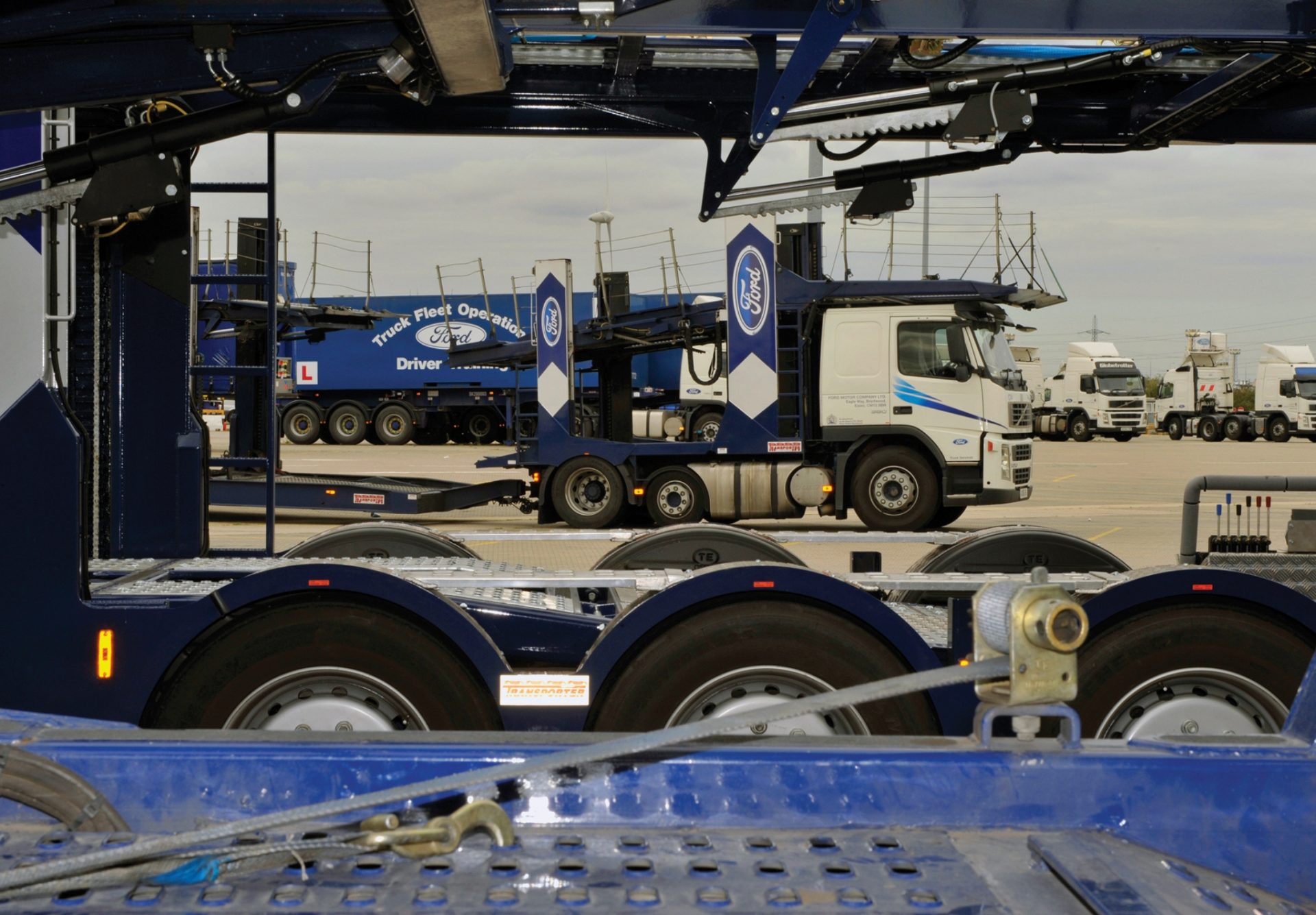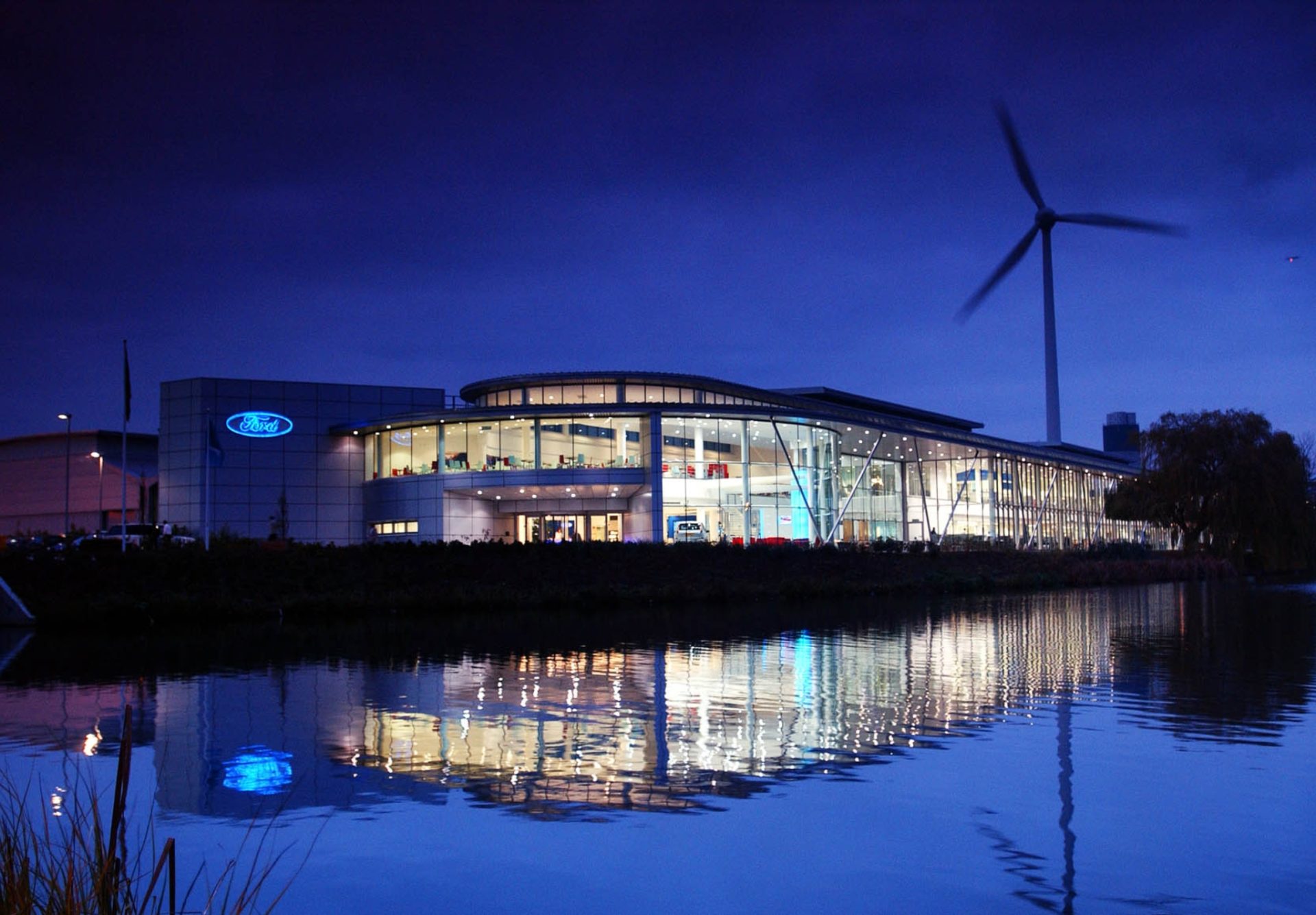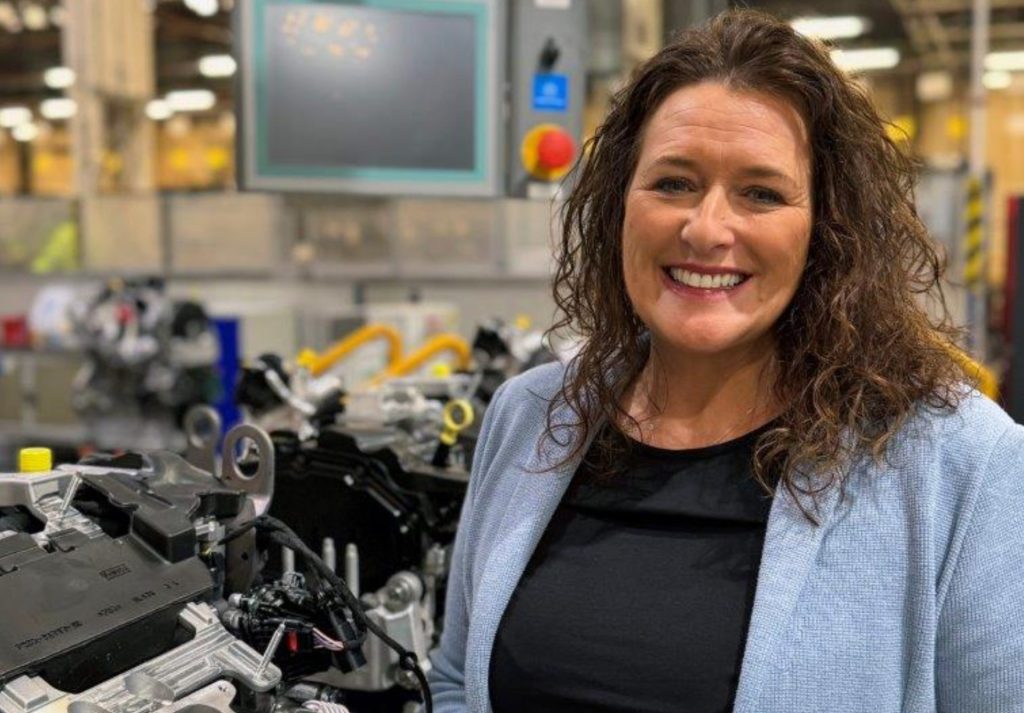Wendy Graham is the first woman Plant Manager in the 97 years of Ford’s iconic Dagenham site, coming 57 years after its women factory workers famously went on strike in a demand for equal pay. The Manufacturer’s Molly Cooper went to the site to speak with her about being a woman in a traditionally male dominated field and what the new role means.
Visiting the Ford Dagenham site was of both personal and professional interest to me. I was excited to speak with Wendy but also, my dad has worked at the site for over 29 years – that’s longer than I’ve been alive. Until now, I had never seen where he worked. Over the years, he’s held various roles across the plant, from the shopfloor to, more recently, the union office. Seeing the site in person provided a greater appreciation of the history and scale of the manufacturing operations that take place there.
Key takeaways
- Wendy’s journey from a farm in Northern Ireland to the top of Ford Dagenham was fuelled by a love of problem-solving and a determination to make an impact in engineering and manufacturing
- Navigating a male-dominated industry, Wendy overcame unconscious bias and the absence of female role models to carve out a leadership style that’s both authentic and inclusive
- She has led high stakes, globally implemented projects such as introducing new, environmentally friendly paint materials and worked across continents to drive innovation and collaboration
- Wendy is steering the Dagenham plant toward a more sustainable, technologically advanced and inclusive future, while fostering a culture of continuous learning and adaptability among the workforces
FAQs
- What products are manufactured at the Ford Dagenham site and what is its production capacity?
- What responsibilities does Plant Manager at Ford Dagenham hold?
- What challenges has Wendy faced as a woman in the automotive manufacturing industry?
- How is Ford Dagenham adapting to future industry trends such as sustainability and electrification?
The Dagenham site manufactures diesel engines and machined components for the global market, predominantly for commercial vehicle products such as the popular Ford Transit Van and Ford Ranger. Currently it produces over 2,100 engines per day, equaling 480,000 per year. To date, the plant has produced and shipped over 49 million engines worldwide.
“I have just recently been appointed the Plant Manager, which is overall operations manager for the site. Before that, I was the Assistant Plant Manager, and was mainly in charge of day-to-day operations and production scheduling. The expanded role means that I have full control over engineering, manufacturing, logistics and the interactions with the external partners, such as our local councils and Thames Freeport,” explained Wendy.

The right path
As a young child, Wendy was always curious about how things worked. “Growing up on a farm in Northern Ireland, we had a variety of different machinery that needed regular repairs.” At school, Wendy saw herself as an all-rounder and even though she enjoyed learning languages, the logic of maths and science appealed more.
Yet, it was a work experience week when she was 16 that was a turning point on her path. “I worked at a drinks bottling and canning factory and seeing the entire process from raw material through to a product that we see on the shelves in the supermarket, sparked something in me,” Wendy continued.
From there, she realised that engineering was all about solving real-world problems and making the world a better place. “It combined my love of problem-solving with an opportunity to make a real impact. Engineering felt like a natural fit for me, aligning with my interests and abilities.”
First impressions
Wendy first joined Ford Dagenham in Vehicle Operations, a large part of the business on the shopfloor. The sheer scale of the operation was overwhelming to a new apprentice. “The speed of vehicles flying past every 90 seconds, the complexity of the operations and the amount of equipment was complete sensory overload,” she explained.
Wendy quickly realised that automotive manufacturing was high pressured, dynamic and was consistently changing its priorities. “Decisions needed to be made quickly. I joined towards the end of a new product launch, so everyone in the plant was getting used to how it all worked so it was a steep learning curve. I spent a lot of time listening, asking questions and learning how things got done.” She also discovered the importance of teamwork, collaboration and how the success of an entire operation depends on how the team work together.
For those also feeling overwhelmed after joining the automotive industry, Wendy believes the best advice is to find a trusted colleague; an unofficial mentor who can help grow your understanding and how you can be more valuable to the organisation. “I was most likely out of my comfort zone 95% of the time, but I adapted to survive,” Wendy said.

The challenges
Being a woman in a traditionally male dominated industry, Wendy admits that there have been some challenges. “Early in my career, I felt that I had to work harder than everyone else to be taken seriously. Looking back, there were certainly instances of unconscious bias, where ideas were overlooked and contributions weren’t fully recognised as my own due to my age and gender.”
Wendy added that one of the biggest hurdles she faced was not having any other female role models to look up to. When joining Ford, there weren’t any women in leadership positions and it wasn’t until her second decade of working at the company before there was a woman leader in the manufacturing organisation. “I’ve never had a woman as my manager, so it was difficult to envisage myself in a leadership position.”
However, when it came to being a leader, Wendy wanted to be true to herself when it came to her management style. “Initially, I tried the ‘macho’ leader style, making sure that when I spoke, it was with facts. I didn’t want to leave room to be corrected. But that wasn’t me, and as time went on, I became more confident in my own knowledge and began expressing my first thoughts, without having to research everything beforehand,” she said.
Wendy also found support in seeking out allies – both male and female – across the business and recognised that change takes time. “Twenty years ago, it was rare to see any women in a manufacturing leadership position. Now I can confidently say that every manufacturing position across Ford Europe has been occupied by a woman at one time, which is real progress. Now, by being visible and successful I’m helping to pave the way for future generations.”
There have also been other challenges that come with working in a manufacturing environment that Wendy has faced. She added: “When you have major equipment failure, and particularly when you work with older equipment, it can cause significant disruption to production.”
Ford Dagenham’s operations are not just local, and the company has global customers, so if a major breakdown does occur, it can cause huge setbacks. “I can stop vehicle operations in Thailand, Argentina and South Africa. The pressure and stress associated with that is high as I’ve become more experienced and more senior in the company and in my position,” explained Wendy.
Once, she was the engineer who needed to find a solution to fix the issue, before becoming the Production Manager who had to report the numbers. “Now I am the plant manager and its taught me the importance of trusting the expertise of the team, remaining calm under pressure, making quick decisions and sticking with them, but flexing if you need to.”
Celebrating the highs
With lows, comes highs and Wendy recalls a significant success being a paint engineering project where she was leading as Chief Engineer in Europe. “I was implementing a new paint material for emissions regulations purposes. However, the change meant that while introducing a new material, we also had to introduce industry first application equipment as well.”
The primary goal was to meet emissions legislation in the future and allow Ford Motor Company to introduce cost efficiencies in its paint application process and reduce energy consumption.
Wendy added: “For me, the project was pivotal. I worked on the base programme which was launched in one plant. After its success I moved roles, but it continued to be rolled out in other plants. In the decade since the initial project, it was replicated across six other plants globally. I was responsible for setting that in motion and it was my first experience of leading a global team.”
Making history
Back in November 2024, Wendy was appointed Plant Manager at the Dagenham site. Starting her career at the same site 30 years ago, Wendy could never have imagined herself in this position. “It’s a tremendous responsibility to be given.
Dagenham has a rich history and a legacy that goes back nearly 100 years.” Dagenham still stands as one of the largest industrial sites in London and to be the first woman to lead the plant after so many years provides Wendy with a sense of pride. “This isn’t just for me but for all the women who have worked at this site before. Women in Dagenham changed the course of history as the strikes triggered the passing of the Equal Pay Act in 1970.”
Wendy hopes that her newest appointment will send a message that anything is possible regardless of gender. “It is now my responsibility in this role to make sure that I lead Dagenham with integrity, innovation and build a diverse and inclusive workforce where everyone can thrive, regardless of gender for future generations. That’s my mission.”

Global experiences
Wendy has worked in different roles and regions, broadening her knowledge and providing her with a deeper understanding of the complexities of the automotive industry.
“My time in global manufacturing engineering exposed me to different cultures. I had teams working across Russia, South America, China and Europe. Learning the importance of cultural sensitivity and ensuring that our workforce were able to work effectively with people from different backgrounds was key to successful production,” she added.
It also taught Wendy the importance of building trust with many of her employees and work partners that she would never meet in person. By understanding that they all share the same goal, the desired result can be achieved regardless of the differences.
She added: “My experience in office-based roles gave me a broader understanding of the financial and strategic aspects of the business. It helped me understand how the manufacturing operations contribute to the overall success of the company.”
Some of those roles were unique and some had Wendy working alone, meaning she had to partner with other departments, and on occasion pitch her workload to other managers, competing for priority over others. Those experiences shaped her leadership by emphasising the importance of collaboration, clear communication and having a global mindset.
“The key to effective leadership is being able to see the bigger picture. You’ve got to understand the needs of different stakeholders and be able to build crossteam relationships as well as those within your own team.”
The next gen and beyond
Encouraging the next generation into manufacturing requires a multi-pronged approach and Wendy believes it starts with changing the perception of what manufacturing is.
“We need to start showcasing the different roles and opportunities that exist within industry, from manufacturing, engineering, design, operations and management. It’s important to reach children early and expose them to STEM in a fun, engaging way.”
Ford UK are involved in school outreach projects and hands-on activities in the local and wider community to get young people involved in the sector. “Mentoring and shadowing are so important. It was a work experience week that sparked my interest for the sector so as a personal mission, I’ve ensured that we have restarted work experience placements for students at Dagenham.”
Another issue pertinent within modern manufacturing is the landscape of the workplace. People are looking for an inclusive workplace, free of unconscious bias, that allows a healthy work/life balance. Companies must also show they are providing opportunities for current employees to one day advance into leadership positions. “For young girls, we need to be highlighting the achievements of women who have worked in manufacturing and have reached senior leadership positions, so they can be seen as role models”, Wendy added.
To those beginning their career in the sector, Wendy stressed that it is important to be yourself and give 100% to your work. “There will be role models for you to follow, good and bad, but by being true to yourself, developing your own skills, honing in on your strengths and tackling your weaknesses, you will succeed.”
Wendy spent her first 17 years at Ford in Vehicle Operations before moving into a role within powertrains. “It was like starting at a new company; I felt like I didn’t know anything. Now, I’m the Plant Manager of an engine plant but I don’t know all the nuts and bolts of every operations – that’s not my job. I have my team to do that. It’s not about knowing everything.
“Through networking with people inside and outside of your company, you will be able to share experiences in a safe and less formal environment than just in your day-to-day work. It’s vital to have external people who you can talk with and learn from.”
Vision for the plant
Wendy wants to continue to showcase Ford Dagenham’s rich legacy of excellence and its ability as a world class, quality manufacturing facility. “My focus is driving innovation to improve quality. When we look at the automotive industry and the challenges we’re currently facing, we need to embrace new technologies and adapt to customer demands.”
Sustainability is now a priority for all manufacturers. “As we continue to supply global markets with diesel engines, which are still in demand for many users across the world, we are also supporting the pivot to electrification,” she said.
Ford are working to enhance the skills of its workforce by offering a service to its Ford Pro-commercial vehicle organisation by providing a bespoke-up-fitting facility. “I’m proud that we’ve brought vehicles back to the manufacturing facility on the Dagenham estate after many years. It’s a testament to the skilled workforce we have here which will stand us in good stead as we bid for future work.”
Continuing to grow
Alongside the projects to improve efficiency, reduce waste and create a more sustainable manufacturing facility, Wendy speaks very highly of the people she has worked with. “I’m most proud of the impact I’ve had on the people I’ve worked with and led through my career. I’ve seen lots progress in leadership positions and flourish in roles that they would never have dreamed of doing when they started,” she said.
This is the most important role Wendy has taken on and she hopes that in the tenure of her position she sees that Dagenham has a clear vision of what it is manufacturing over the next decade and beyond. “I hope for a flexible workforce who are able to pivot between assembling engines and other manufacturing activities for the purpose of future-proofing the plant.”
For more articles like this, visit our People & Skills channel


